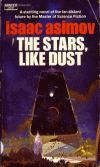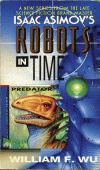Timeline discussion:
Here are a couple quotes — “Atomic warfare had done its worst to Earth. Most of it was hopelessly radioactive and useless.” and “The radioactivity of the soil was a vast sea of iridescent blue, sparkling in strange festoons that spelled out the manner in which the nuclear bombs had once landed, a full generation before the force-field defense against nuclear explosions had been developed, so that no other world could commit suicide in just that fashion again.” — The Stars, Like Dust
This explanation contradicts what took place at the end of Robots and Empire, which was written 35 years later. I guess Asimov has the right to change history, or we can attribute the discrepancy to historical inaccuracies within the world he created. After all, the Horsehead Nebula in the book is named after “Horace Hedd” rather than for looking like a horse’s head. About 50 years before, the Nebular Kingdoms have been conquered by the Tyranni. They rule thousands of worlds from the home planet of Tyrann.
The main plot in this novel revolves around Biron Farrill, son of the Rancher of Widemos. The Rancher is implicated in a conspiracy against the Tryranni. Biron had been sent to Earth on a mission to recover a mysterious and dangerous ancient document which is supposed to be the key to the rebellion. Biron is thrust into a whirlwind of action and mystery after there is a failed attempt to kill him with a micro radiation bomb. He finds himself being guided to Rhodia, one of the strongest worlds in the Nebular Kingdoms, to plead for asylum with the planetary Director. From there he learns about a “Rebellion World” which might be the only hope of defeating the oppressive Tyranni.
At 200 pages this book is rather short, and the pacing moves pretty quickly. The overall feel of the book seems like it could happen in medieval times, except for the fact that there are thousands of worlds and ships that use hyperatomic motors. It seemed pretty obvious when Asimov shifted into Sci-Fi mode when explaining how much of the technology and concepts about planetary systems and space travel. I think that his later books are integrated better, but considering this book was written in 1950, it seems to hold up rather well.



